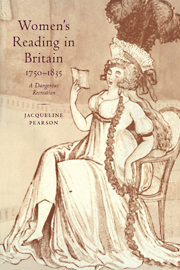Book contents
- Frontmatter
- Contents
- Preface
- Introduction
- 1 Pygmalionesses and the pencil under the petticoat: Richardson, Johnson and Byron
- 2 What should girls and women read?
- 3 The pleasures and perils of reading
- 4 Pleasures and perils of reading: some case histories
- 5 Where and how should women read?
- 6 Preparing for equality: class, gender, reading
- 7 A dangerous recreation: women and novel-reading
- Conclusion
- Notes
- Select bibliography
- Index
6 - Preparing for equality: class, gender, reading
Published online by Cambridge University Press: 22 October 2009
- Frontmatter
- Contents
- Preface
- Introduction
- 1 Pygmalionesses and the pencil under the petticoat: Richardson, Johnson and Byron
- 2 What should girls and women read?
- 3 The pleasures and perils of reading
- 4 Pleasures and perils of reading: some case histories
- 5 Where and how should women read?
- 6 Preparing for equality: class, gender, reading
- 7 A dangerous recreation: women and novel-reading
- Conclusion
- Notes
- Select bibliography
- Index
Summary
Things are getting worse and worse in France. A lady of quality, the other day in Paris, rung her bell, and desired the footman to send up her maid Jeannotte. In vain she rung and rung: the man told her, Jeannotte refused to come, or be any longer under any body. At last Jeannotte walked into the room with a pamphlet open in her hand, and sat down. The lady astonished, asked her what she meant. ‘I' reading’, said Jeannotte, without taking her eyes off the book. The lady insisted on an explanation of this impertinence. The maid replied with great sang froid, ‘Madame, we are all going to become equals, and I am preparing for equality’.
In this letter to her sister in 1790, Hannah More deplored the disorder in France after the fall of the Bastille. The More sisters were pioneers in the movement to educate the poor: yet here a servant's reading provides a readily decipherable symbol of anarchy, still sharper because the servant is a woman. More's anecdote extends its theme of the class specificity of good reading from the rebellious servant to possible readers of the letter. Although I have translated the maidservant's words, More gives them in French. Her, and her sister's, knowledge of that language demonstrates genteel education and status, and no lowerclass person who saw the letter could emulate the maid's transgressive reading act because the account of it is coded in a form only accessible to the genteel reader.
- Type
- Chapter
- Information
- Women's Reading in Britain, 1750–1835A Dangerous Recreation, pp. 176 - 195Publisher: Cambridge University PressPrint publication year: 1999



